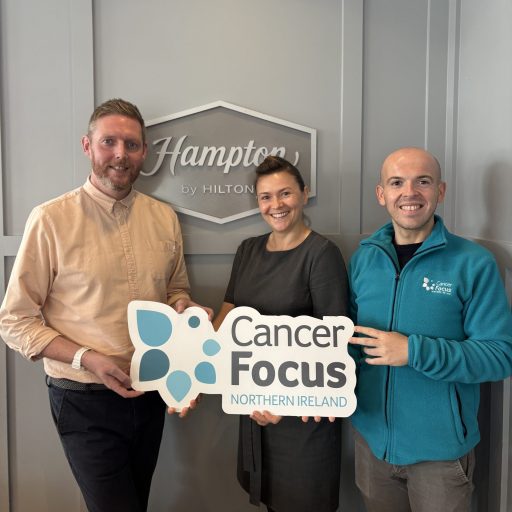
Cancer Focus NI responds to Covid’s impact on number of people diagnosed with lung cancer in official 2020 statistics
Cancer Focus Northern Ireland has welcomed today’s release of the Northern Ireland Cancer Registry’s most up to date statistics on lung cancers diagnosed here. The document includes information on the number of lung cancers diagnosed in Northern Ireland in 2020. It includes information on numbers, stage at diagnosis, and survival.
Welcoming the report Richard Spratt, CEO of Cancer Focus NI said, “This latest report illustrates the impact of covid in delayed diagnosis of lung cancer during 2020. There was an overall 7% drop in diagnosis.
“The reduction in the number of people with an early diagnosis is especially stark with 18% fewer people diagnosed at Stage I and a 4% increase in Stage IV diagnoses. This is a clear indication that covid pandemic discouraged significant numbers of people from accessing an early diagnosis.”
Lung cancer is one of the most common cancers in Northern Ireland. It is the leading cause of cancer deaths and over 1,045 local people die here every year from lung cancer.
Early detection is crucial with 5-year survival for people detected and treated at the early (Stage I) lung cancer being around 50% compared with 1% for people detected at late (Stage IV) lung cancer.
Richard continued: “This highlights the urgent need for strong public awareness campaigns on lung cancer with clear prevention and early diagnosis messages. Awareness campaigns have enormous potential to impact on behaviour change, seeking advice and engaging with screening services, particularly in areas of deprivation.
We will continue to deliver our vital cancer prevention work and encourage people to become aware of the signs and symptoms of cancer. If you have any concerns, go to your GP immediately. Pilot programmes using CT scans to screen for lung cancer are being established across the UK including in the Southern Health and Social Care Trust. These need to be rolled out throughout Northern Ireland as soon as possible. Early detection saves lives.”
The figures show the longstanding disparity in lung cancer incidence patterns in our society remain. Lung cancer incidence was 69% higher than average in the most deprived areas and 34% lower in least deprived areas. This is due to complex interactions of many social, economic and lifestyle factors including higher smoking prevalence in the most deprived areas (22%) compared with least deprived (7%).
Richard added, “At least 80% of lung cancers are caused by smoking. These figures highlight the enormous toll that the tobacco epidemic places across our society. However, the positive aspect is that there is enormous potential for prevention of lung cancers.
“Cancer Focus NI will continue to place tobacco control at the centre of our services for local people. The very best thing people could do to improve their health is to stop smoking. If you need help to quit, our Cancer Focus NI’s award-winning Stop Smoking service, funded by the Public Health Agency, is available via GP practices, health and wellbeing centres, community, workplace and youth settings. Cancer Focus NI’s long established stop smoking services prioritise the most deprived and ‘at risk’ communities where incidence is highest.”
Richard continued: “This report confirms the impact of Covid. It also helps identify trends and future practice, policy and strategy. Finally, it reinforces the need for long term budgetary and workforce planning to enable a comprehensive cancer strategy that focuses on cancer prevention and early diagnosis and treatment.
For more information contact coletteheaney@cancerfocusni.org







